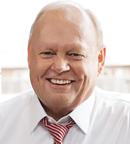Like many men, it never occurred to me that I could get breast cancer. But it turns out it is more common—and deadly—than I thought, with about 2,600 men diagnosed each year with invasive breast cancer and nearly 440 dying of the disease.1 In 2010, I became one of those men, and the diagnosis was so shocking and, yes, embarrassing, I couldn’t talk openly about it for over a year.
I was lucky. My breast cancer was discovered after a trip to the emergency room following a gallbladder attack, and an imaging scan spotted a large mass, about the size of a half dollar, in my left breast. I was sent to the local women’s health center for a mammogram, which was so humiliating; I brought my wife along so patients in the waiting room would think she was the one being tested.
The doctor then performed a breast ultrasound and took several tissue samples for a biopsy. Even though it was clear there was something very suspicious about the mass, it never occurred to me that it could actually be cancer. I have four sisters, none of whom, thankfully, have been diagnosed with breast cancer, and there is no history of the disease in our family, so breast cancer was the farthest thing from my mind. And, also, men don’t get breast cancer, right?
Surgery and Chemotherapy
When my primary care physician called me at work to give me the diagnosis, stage II hormone receptor–positive breast cancer, I was so shaken; I raced home and curled up into a ball on the couch, sure I was going to die. Although my doctor said a nurse would call in the morning with information about my next steps, I couldn’t wait that long and went online to find a breast surgeon and made an appointment to see her.
Three weeks later, I had a full mastectomy. Because one lymph node tested positive for cancer, I had additional surgery to biopsy more lymph nodes and surrounding tissue; all tests were negative, and so I had four rounds of combination chemotherapy to kill any errant malignant cells. I don’t remember the type of chemotherapy I had, but I know it made me so sick I had to stay in bed for 3 days following each treatment, and the taste of metal in my mouth was so overwhelming, it was difficult to eat.
Next, I was prescribed 5 years of tamoxifen to help prevent a recurrence, and the side effects from that treatment—nausea, hot flashes, and weight gain—were difficult to tolerate physically and also psychologically. Men just don’t expect to have to deal with hot flashes. Fortunately, I finished the therapy last summer, and there are no signs of cancer recurrence.
Wearing Pink and Blue Ribbons
Although I don’t think breast cancer is physically worse for a man than a woman, I believe it is psychologically more difficult to cope with a disease so affiliated with women. For one thing, there are few support systems in place for men. I didn’t keep silent for so long only because I was too embarrassed to talk about my breast cancer; I didn’t know who to talk to. I’m fortunate to have a wonderful wife, two sons, and grandchildren who supported me throughout my treatment and recovery, but I couldn’t talk to them about my fears. I needed to talk to other men who had gone through the same experience and had come out the other side.
From Onlooker to Activist
Through the American Cancer Society (ACS), I found a male breast cancer survivor, who I still haven’t met with face-to-face, but we’ve become best friends. It was so comforting to have someone to talk to who understood what I was going through. I’ve become a volunteer for the ACS’ Reach To Recovery program, and I’m currently helping six male breast cancer patients around the country cope with their diagnosis.
I’m also trying to raise awareness of male breast cancer and help destigmatize the disease for the thousands of men who are living with breast cancer and for those who will be diagnosed this year. I’ve become involved in the Male Breast Cancer Coalition (malebreastcancercoalition.org). Last year, we successfully lobbied our state legislators to proclaim the third week in October Male Breast Cancer Awareness Week, and other states are following suit. I’m also a Susan G. Komen for the Cure Ambassador and give TV and print interviews about the need to recognize that breast cancer happens to men too.
Cancer Is a Family Affair
Being so public about my diagnosis has helped in my healing process and has brought my family closer together. Breast cancer, in fact any cancer, is a disease that affects the whole family, and we have become more vigilant about getting cancer screenings and making lifestyle changes to decrease our risk for the disease. I’m also hoping that raising awareness about male breast cancer will spur more men to participate in clinical trials, so that more lives can be saved.
Breast cancer may not be considered a manly disease, but it has made me a better man. ■
Reference
1. American Cancer Society: What are the key statistics about breast cancer in men? Available at cancer.org/cancer/breastcancerinmen/detailedguide/breast-cancer-in-men-key-statistics. Accessed February 5, 2016.
Darrell Skaggs lives in Brownsburg, Indiana.


